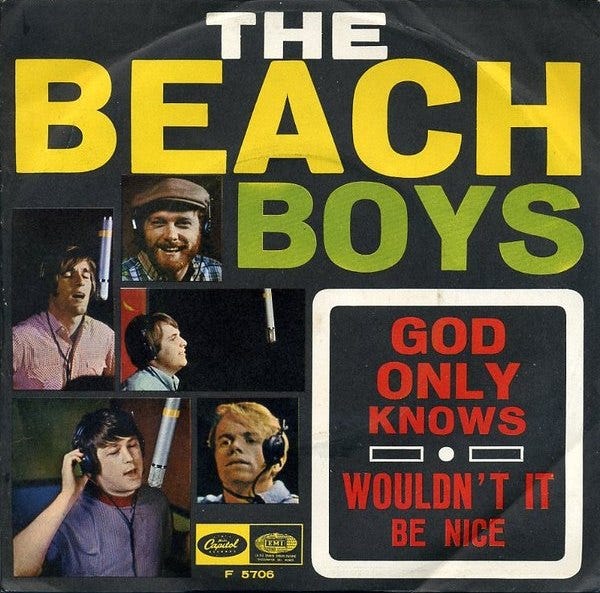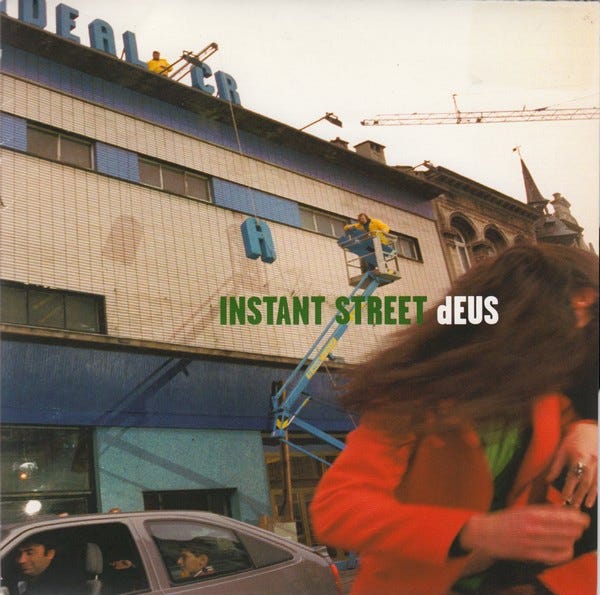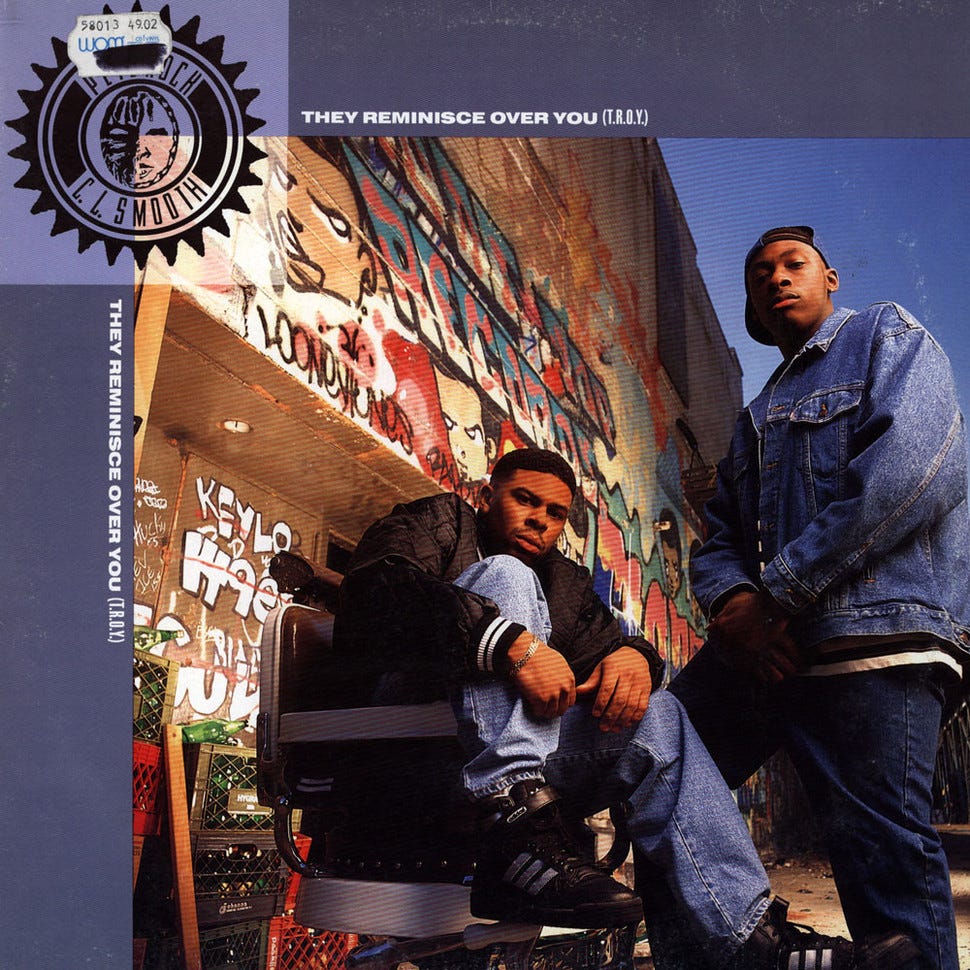I’ve long wondered, idly and indulgently, what songs I might include were I ever invited on to BBC’s 81-year-old radio program Desert Island Discs. Each week, a “castaway” — typically a celebrity of some sort — is interviewed about their life and career, and asked to share, and discuss, the eight songs they’d take with them to the remote, fantastical island (along with one book and one “luxury” item — the BBC’s benevolence also guarantees the castaway a copy of the Bible and the complete works of Shakespeare).
To pick only eight is absurd, almost arbitrary. There’s hundreds of songs from which I could happily choose from. If I were to write this next month, it might be entirely different. But who cares? It’s been fun. Here are the first four…
“God Only Knows” The Beach Boys (1966)
It’s 2006, I think, and I’m getting into Joe’s car. It’s old, funky, semi-rusted — like most everyone’s car was then. It has dark vinyl seats, which have been transformed into sheets of lava by the Perth sun. To enter a car in those summers was to awkwardly negotiate, in shorts and singlets, the scorching upholstery. Contact stung bad, and while your sweat eventually cooled the offending surface, your flesh was left painfully adhered.
Anyway: we were off to the beach, and five or six of us filled the car. In those days, Joe played in a very good band called Snowman, a band which meant quite a bit to us then, and as he drove, he slipped into his car’s tape deck the sacramental Pet Sounds.
I’d heard “God Only Knows” before, of course, but there was something about hearing it then that made me feel like it was for the first time. I don’t know why. Was Joe harmonising with the Wilson brothers, as he drove? Did we sing along? Did I feel especially free that day, liberated from my usual anxiety? I can’t remember. But I do remember thinking in that moment that the song might be perfect. And I remember thinking that I never wanted it to stop.
I still think that. That it’s perfect. If it has an imperfection, it’s that its heavenly outro of cascading vocals is cut too short. “Perfect” is an ostentatious word, a silly word, a word used when words have failed you. But still.
“Instant Street” dEUS (1999)
I’ve developed an acute fondness for outros. Large, driving, propulsive things. It’s now become a kind of idiosyncratic measure for me. I’ve always loved the outro to You Am I’s “Berlin Chair” — even if it’s a modest 30 seconds — and the throbbing, confidently extended conclusion to The Pixies’ “Gigantic”. The back-half of Deerhunter’s “Nothing Ever Happened” can make me delirious; the same goes for the dreamier, infinitely calmer outro of Teenage Fanclub’s “The Concept”.
Then there’s this song. I first heard it in the office of Grok magazine, the campus rag I was then working for as deputy-editor, while truculently resisting its editorial changes. We were, at the time, the highest-circulated university ‘paper in the country, and our pay-masters had grown tired of our weird tastes, sarcasm and profane Gonzo screeds: we were pissing away its commercial potential. Plus, I kept picking fights with the student union — in print, or the campus pub next door.
It was time for the bean-counters to clean up, get serious — and so the old editor was gone, and in came a dull, lovely, commercially-minded bloke who understood professional deference and the value of a dollar. I was bored, jaded, and wouldn’t last much longer.
It was 2002, and my Dutch boss had excitedly plucked a dEUS album — a collection of their singles — from the busy review stacks. His being Dutch is significant here: dEUS are Belgian, and well known in neighbouring Holland, but had practically zero profile in Australia. I’d never heard of them before. With a pleasurable sense of ceremony — he was introducing his long-haired and supercilious deputy to something new, after all — he placed the CD in our tiny, portable stereo and pressed play on track 8. Supreme pleasure, excitement and incredulity followed. My. Fucking. God.
Immediately, I asked if I could borrow the CD — as my boss now had dibs on it. He agreed, and that afternoon I excitedly rushed to a friends’ share-house in Fremantle and, as a storm came in over the ocean and we all sat on the front porch drinking, I played the song repeatedly at great volume. And against the rain and thunder, I danced, sung, played air-guitar. The beautiful thing? I think my friends were almost as excited as me. I’ve been in love ever since.
The song is effectively made of two distinctive halves, and I love both. But especially when the transition begins at 3 minutes and 30 seconds, and the acoustic guitar and banjo eventually make way for the escalating, joyous cacophony of electrified guitars and increasingly urgent drums. It remains my favourite outro of all time – an exhilarating, majestically powered thing.
Curiously, for a band that has provided me with something so cherished, I’m largely indifferent to everything else they’ve done. The album that “Instant Street” comes from, The Ideal Crash, is good — and there are moments on their earlier ‘90s records. But, really: I only listen to this song. I saw them play live, about a decade ago, really just to see this one song. The rest of the set was almost insufferable to me.
And that’s fine. They’ve given me this.
“They Reminisce Over You (T.R.O.Y.)” Pete Rock & CL Smooth (1993)
It was a freak accident. In 1990, while on tour with Heavy D & the Boyz, one of the group’s dancers — Troy Dixon, aka Trouble T-Roy — was fooling around in the stadium they’d just played in. While standing upon the arena’s third-level ramp, another member rolled a trash can towards him as a joke. Dixon jumped upon a retaining wall to avoid it — then fatally toppled off the other side. He was 22.
Both the producer, Pete Rock, and the MC, CL Smooth, were close with Dixon. They’d all grown up together in Mount Vernon, New York, mostly harmoniously, sometimes rivalrously.
They were devastated by his death. To make sense of it, Smooth had his notebook; Pete Rock his SP-1200 sampler — the tech bed-rock of hip-hop’s Golden Age. Smooth wrote three verses, the first two given to a melancholic remembrance of his absent father and the influence of his mother and uncle; the final verse a conversation with his dead friend. Meanwhile, Pete Rock had made an enchanted discovery — Tom Scott and the Californian Dreamers’ cover of Jefferson Airplane’s “Today” and went to work re-making it on the SP. In 2007, Pete Rock told the Village Voice:
I was kind of depressed when I made it. And to this day, I can’t believe I made it through, the way I was feeling. I guess it was for my boy. When I found the record by Tom Scott, basically I just heard something incredible that touched me and made me cry. It had such a beautiful bassline, and I started with that first. I found some other sounds and then heard some sax in there and used that. Next thing you know, I have a beautiful beat made. When I mixed the song down, I had Charlie Brown from Leaders of the New School in the session with me, and we all just started crying.
I’ve never stopped listening to the song since I first heard it, perhaps two or three years after its release. It has claim, I think, to being my most listened to song ever — my love untouched by 25 years of repetition.
“Get a Room” Jim O’Rourke (2001)
I don’t really care about lyrics. I mean, I do, but they’re secondary — a sweet bonus. Sometimes you have world-beating tunes matched with deep and memorable lyricism — “America”, say — and it’s thrilling. “‘Kathy, I’m lost,’ I said, though I knew she was sleeping.”
I mention this because, while I adore the music of this song, unusually it’s the lyrics — the song’s whole conceit, actually — that has helped it become a permanent tenant in my head for almost two decades.
That conceit starts with this hypothetical:
If I gave you one night to live, would you know who to choose to take home? /
And if she falls asleep, before the night is through, Because she has to go to work and you don’t?
But then the perspective shifts. The reality changes. It is now actually happening: You are in a bed, slowly dying, beside a sleeping stranger(?) — and, for unspecified reasons of illness and temperament, incapable of saying anything — much less raging against the dying of the light. You’ll be dead by dawn.
And you try to move towards her
But you can’t move your shoulder
And your sight’s getting dimmer
Maybe if you kick her
But your leg’s getting weaker
And she’s such a deep sleeper
And you would get a snorer
To share your last hour
And you would get a snorer. It’s funny as hell. But it’s also one of the sharpest, saddest, most claustrophobic descriptions of loneliness I’ve ever heard in song. And that sense of loneliness is only compounded by the intimate proximity of another. She’s so close, but so far.
Why doesn’t he scream? Why doesn’t he tell her? He’s resigned. Pitifully, comically resigned. And by the time he might want to scream — to hysterically announce his demise, to demand companionship in his last hours — his muscles are cruelly frozen.
The lyrics and music loop, complementing the ironically endless-seeming last night — the lines repeating, softly, over and over, before, finally, fading out. It’s gorgeous and painful:
You sure picked a winner
And time’s seeming slower
And now you can’t see her
All you see is a timer
Moving backwards and forwards
And the night’s getting longer
And your skin’s getting colder








